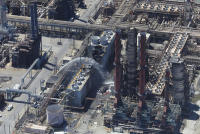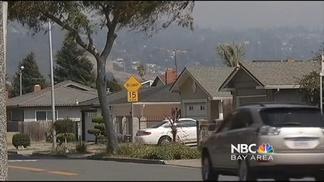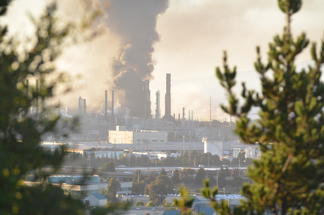Richmond sues Chevron over last year's refinery fire
By Robert Rogers
Contra Costa Times
Posted: 08/02/2013 02:31:12 PM PDT
Updated: 08/02/2013 02:48:26 PM PDT
Click photo to enlarge

Firefighting crews continue to pour water onto a unit after a fire at a Chevron refinery on...
RICHMOND -- The city sued Chevron on Friday for damages stemming from last summer's fire at the energy giant's local refinery.
The suit, which drew a sharp response from Chevron, comes after months of negotiations between city officials and company executives and their attorneys ended in an impasse.
"We did have talks," Mayor Gayle McLaughlin said at a City Hall news conference. "We couldn't come up with an agreement. That is why we have taken this next step."
McLaughlin shared the lectern with attorney Frank Pitre, a partner with Burlingame-based Cotchett, Pitre & McCarthy, which represented victims of the 2010 San Bruno disaster caused by a Pacific Gas & Electric Co. gas line rupture.
Pitre said his firm's 39-page suit, filed in Contra Costa County Superior Court, seeks compensation for four areas of damages. Pitre said the city incurred economic losses providing emergency response to the fire and monitoring air quality; suffered environmental harm; has been hampered by the stigma from decades of releases and accidents; and that Chevron's negligence interferes with residents' rights to "comfort and enjoyment" of their community.
"This is a company that has sacrificed safety to profits," Pitre said.
Chevron, which for months has sounded conciliatory notes to criticism leveled by city officials and federal, state and regional investigators probing the fire's causes, slammed the city for filing suit.
"The city's meritless lawsuit is a waste of its own resources and yet another example of its failed leadership," Chevron spokeswoman Melissa Ritchie said in a prepared statement. "The baseless allegations against Chevron USA are plainly intended to divert attention away from a dysfunctional City Council."
Ritchie added that Chevron will "vigorously" defend itself but will " ... remain dedicated to those in the Richmond community who truly wish to improve the quality of life in Richmond and West Contra Costa County."
Councilman Tom Butt said this is the first time the city has sued Chevron since he began his tenure on the City Council since 1999, and he believes it's the first suit ever by the city against the energy giant.
The Aug. 6 fire knocked out the No. 4 crude unit for months and sent more than 15,000 residents to area hospitals complaining of respiratory discomfort and other symptoms. The fire occurred when a corroded pipe ruptured.
The state Division of Occupational Safety and Health (Cal/OSHA) found that the refinery was guilty of 11 "willful" violations and fined the corporation about $1 million, the highest fine in the agency's history. The U.S. Chemical Safety Board's investigation found that the pipe was recommended for replacement by Chevron inspectors as early as 2002.
Pitre told reporters he will hire economists and other experts to attempt to quantify total losses.
"These amounts of money are within the discretion of a jury," Pitre said. "I am not going to speculate on numbers at this point."
The lawsuit follows news earlier this week that Chevron has agreed to pay the Bay Area Air Quality Management District $190,000 to settle air quality violations at its Richmond refinery before the fire.
The civil settlement covers 19 violations at the refinery reported between 2010 and August 2012.
Pitre noted that Chevron has reported profits of more than $26 billion in the past two years. On Friday, the company reported $5.37 billion in profits for its second quarter, 26 percent below last year's levels because of weaker oil prices and refinery maintenance work.
Chevron doesn't divulge exactly how much the fire affected production. The unit was offline for six months.
The fire also resulted in a drop in the refinery's property value, resulting in a tax break for the company.
Pitre and McLaughlin took exception to Chevron's criticism of the city's leadership in its statement, which circulated minutes before the news conference.
"Chevron won't let the city of Richmond or their council members into the boardroom," Pitre said. "This is a question of corporate culture and the decisions made by Chevron for more than two decades behind closed doors."
Staff writer George Avalos contributed to this story. Contact Robert Rogers at 510-262-2726 or rrogers@bayareanewsgroup.com. Follow him at Twitter.com/roberthrogers.
***
For video, see: http://www.nbcbayarea.com/news/local/Richmond-Files-Lawsuit-Against-Chevron-For-Alleged-Negligence-in-2012-Refinery-Fire-218120531.html
Richmond Files Lawsuit Against Chevron For Alleged Negligence in 2012 Refinery Fire
By Bay City News
| Friday, Aug 2, 2013 | Updated 12:26 PM PDT
Lawsuit alleges the explosion and blaze at the Richmond refinery on Aug. 6, 2012, resulted from "years of neglect, lax oversight and corporate indifference to necessary safety inspection and repairs." Jodi Hernandez reports.
Photos and Videos

City of
Richmond Sues Chevron

PHOTOS
Chevron
Refinery Catches Fire
More Photos and Videos
The city of Richmond sued Chevron Corp. in Contra Costa County Superior Court today for alleged negligence in last year's massive refinery fire, accusing the oil company of "willful and conscious disregard of public safety."
The lawsuit alleges the explosion and blaze at the California Bay Area refinery on Aug. 6, 2012, resulted from "years of neglect, lax oversight and corporate indifference to necessary safety inspection and repairs."
The fire occurred after a leak in a corroded pipe in the refinery's crude oil unit created a large cloud of hydrocarbon vapor that ignited in a fireball at about 6:30 p.m. that day.
RAW VIDEO: Chevron Refinery Erupts in Fire
The fire burned for several hours before being controlled and sent a huge plume of toxic black smoke over the area. More than 15,000 people were treated at hospitals for respiratory problems and other illnesses.
The lawsuit, authorized by the City Council last week, seeks financial compensation for economic damage to the city, including the costs of emergency response, firefighting, environmental cleanup, alleviating harm to public health, and loss of value in city property.
A jury would determine the amount of compensation at a trial.
The lawsuit also asks for an additional punitive financial award "to ensure that an example is made" of Chevron to deter similar alleged conduct in the future.
Chevron spokeswoman Melissa Ritchie said on Thursday, "We believe the decision to pursue such a suit is a waste of the city's resources and yet another example of its failed leadership."
The lawsuit accuses San Ramon-based Chevron of negligence in ignoring the danger of corrosion to carbon steel pipes from sulfur compounds in crude oil heated to high temperatures; using "woefully inadequate" inspection techniques; and failing to replace the pipes.
It also faults the company for failing to shut down the crude oil unit as soon as the leak was noticed at 3:48 p.m. and instead trying to repair the pipe while the unit continued to operate.
The unit was eventually shut down two hours and 40 minutes later, after the vapor cloud formed and several minutes before the explosion, according to the lawsuit.
In addition to negligence, the lawsuit makes six other legal claims.
One claim is for strict liability for an ultrahazardous activity, a legal doctrine under which a person who conducts an abnormally dangerous activity is responsible for harm it causes.
PHOTOS: Chevron Refinery Catches Fire
The lawsuit contends that maintaining the allegedly "old dangerous and shoddy refinery," which was founded in 1902, in a densely populated area is an ultrahazardous activity.
The other claims are for creating continuing and permanent private nuisances on city property; creating continuing and permanent public nuisances on public property such as parks and streets; and trespass of chemical pollutants, soot and ash on city property.
|

